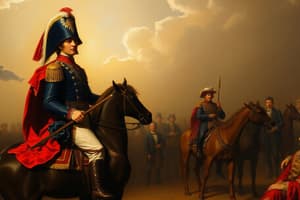Podcast
Questions and Answers
What was the purpose of the Berlin Decree issued by Napoleon in 1806?
What was the purpose of the Berlin Decree issued by Napoleon in 1806?
- To gain control of Portuguese ports
- To strengthen British trade with continental Europe
- To prevent British ships from accessing ports under French control (correct)
- To establish trade agreements with Britain
What was the impact of the Milan Decree issued by Napoleon in 1807?
What was the impact of the Milan Decree issued by Napoleon in 1807?
- It established trade agreements with Britain
- It aimed to prevent neutral ships from carrying British goods to continental Europe (correct)
- It facilitated British trade with continental Europe
- It strengthened French trade with Portugal
What system was established by the Berlin and Milan decrees to block British trade?
What system was established by the Berlin and Milan decrees to block British trade?
- European Embargo
- British Blockade
- Continental System (correct)
- Atlantic Alliance
Why did the Peninsular War begin in 1808?
Why did the Peninsular War begin in 1808?
What was the outcome of the Peninsular War by April 1814?
What was the outcome of the Peninsular War by April 1814?
Why did Czar Alexander I of Russia withdraw from the Continental System in 1810?
Why did Czar Alexander I of Russia withdraw from the Continental System in 1810?
What was the impact of the Peninsular War on Napoleon's prestige?
What was the impact of the Peninsular War on Napoleon's prestige?
What was the outcome of the Battle of Borodino?
What was the outcome of the Battle of Borodino?
Where was Napoleon first exiled after his abdication in 1814?
Where was Napoleon first exiled after his abdication in 1814?
What happened at the Battle of Leipzig in October 1813?
What happened at the Battle of Leipzig in October 1813?
Where did Napoleon die?
Where did Napoleon die?
What did Napoleon do after his return from Russia?
What did Napoleon do after his return from Russia?
Where were Napoleon's remains brought in 1840?
Where were Napoleon's remains brought in 1840?
What did Napoleon aim to achieve in Europe?
What did Napoleon aim to achieve in Europe?
How is Napoleon's legacy described in the text?
How is Napoleon's legacy described in the text?
Flashcards are hidden until you start studying
Study Notes
Napoleon's Military Campaigns and Exile
- In 1812, Napoleon assembled a 600,000-strong army to attack Russia, while the Russian army had about 200,000 troops.
- The campaign led to the Battle of Borodino, a narrow French victory, and the subsequent devastating retreat from Moscow, during which about 500,000 of Napoleon's troops died, deserted, or were captured.
- After his return from Russia, Napoleon faced a hostile alliance of Austria, the United Kingdom, Russia, Prussia, and Sweden.
- Following initial victories, Napoleon was defeated at the Battle of Leipzig in October 1813 and subsequently retreated into France.
- Napoleon abdicated in 1814 and was exiled to the island of Elba off the northwest coast of Italy.
- In 1815, Napoleon returned to France, leading to the period known as the Hundred Days, during which he was defeated at the Battle of Waterloo.
- Napoleon surrendered and was sent to the British island of St. Helena, where he died in 1821.
- In 1840, his remains were brought to Paris and laid to rest at the Église du Dôme (Church of the Dome).
- Napoleon was a significant military commander, but he has been portrayed as a power-hungry conqueror, despite his efforts to build a federation of free peoples in a united Europe under a liberal government.
- He granted constitutions, introduced law codes, abolished feudal obligations, created efficient governments, and fostered education, science, literature, and the arts in the states he created.
- Napoleon's life and legacy have inspired great writers, filmmakers, and playwrights, contributing to the creation of the Napoleonic legend.
- His actions and intentions have sparked debate, as he concentrated power in his own hands while aiming to unite Europe under a liberal government.
Studying That Suits You
Use AI to generate personalized quizzes and flashcards to suit your learning preferences.




